

Both types of people can enrich their knowledge and experience something unusual, through what is knows as "wine tourism."
And no, one doesn’t have to travel to Tuscany or Napa Valley in order to do this. Apparently this also exists here, under our noses. There are wineries scattered all across Israel, from north to south, all ready to take in visitors, offer a glass of wine, a story, a tour, and additional attractions as well.
Combine a number of such wineries on a one-day trip and you will be in for an unforgettable experience, regardless of whether you own a wine cellar or haven't tasted wine since the Passover Seder.
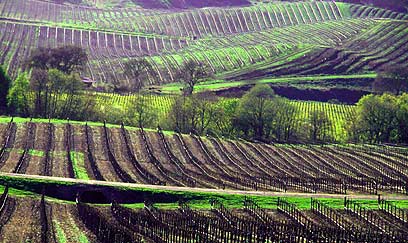
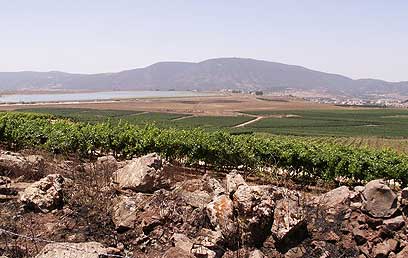
"The wine tourism developed after the Middle Ages," explains Dr. Ran Cohen, a lecturer on the development of tourism sites. "Feudal lords would stay as guests in each other's farms, and would be served with wine and – I apologize for being blatant – women."
In the wine tourism's second round, it appeared as part of professionalized tourism. "Today tourism has gone from sunbathing to tourism offering an interest to certain sectors of the population."
To put it in simpler terms, because there were more people interested in wine, the wineries decided to open their gates to visitors, creating the wine tourism field, this time without the women.
In Israel this is a relatively new field. The production of high-quality wine only began in the 1980s in the Golan Heights wineries. Till that time, all one could find in Israel was cheap wine which caused headaches.
"At first, we saw the development of tourism for people who know what's what," explains Dr. Cohen. "If I were a winemaker or had a wine cellar, I would walk about wineries and taste wine."
In 1988, the first visitors' center was opened in a winery in Rishon Lezion, which essentially raised the interest in the "behind the scenes" of wine. One no longer had to understand in wine in order to visit a winery, as the visitors' center was founded in order to explain wine to those who don't understand it.
Today there are more than 200 wineries, with the larger ones having visitors' centers, and in the smaller ones, the boutique wineries, one can simply visit the owner's home and taste fine wine.
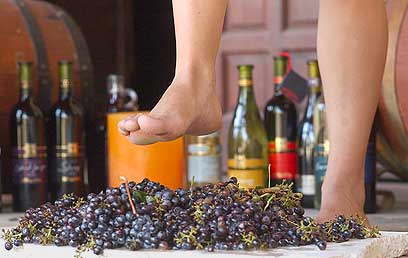
How to create wine tourism
Planning an Israeli wine tour on your own is not that difficult. Arnon Erez, 67, from the Jerusalem suburb of Anatot, a winemaker and a certified tour guide, recommends organizing a one-day tour to three to five wineries. More than that would be too much. A designated driver should also be appointed.
Erez divides the country into four areas where wineries are assembled. "The first place is in the Negev area. Then there is the Yoav-Judea region, which starts in Kiryat Gat and ends in Jerusalem. Then there is an area from Gdera to Zichron Yaakov in central Israel. The next area is in the north, the Galilee and the Golan Heights."
In order to make things easier, there is a map marking all the wineries in Israel, starting from the largest one down to the small family one. The map of Israel's Wine Routes can be obtained in most hotel, wine shops or Tourism Ministry bureaus.
The advantage of planning a trip on your own is that it can focus on specific attractions, such as the wine holiday at the Taninim River in Beit Hanania. Thi nature reserve inhabited with crocodiles decided this year to take part in wine tourism throughout September. The place offers a train tour of the vineyards, an opportunity to press grapes and taste wine, and a bottle of wine for the brave (or stupid?) person who would dare pet a crocodile.
If you are one of those people who are certain that Zichron Yaacov is located south of Jerusalem, there is nothing to be ashamed of. You don’t have to plan a wine tour on your own. Erez, for example, would be happy to plan your trip for you, and to take you from one winery to another. And don’t worry, as long as he drives he doesn’t drink.
"Unfortunately, most people go to Italy and France for a tour of wineries," Erez says, "but one doesn’t have to go that far to enjoy a one-day trip in which you can listen to explanations on growing methods and types of wine and tour the vineyards."
When you book a tour with Erez, he accommodates himself to your demands. "Most people who go on the trip want to see the vineyard's scenery, and if there is a winery there as well, then why not?"
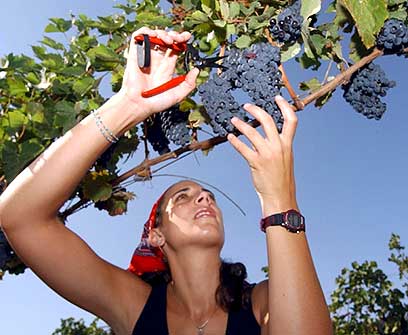
What does one do at the winery?
"There are wineries which invite you to see the process, taste the wine from the barrels, walk about the winery. And there are those with a visitors' center, which provides bottles and glasses and lets you taste whichever wine you want to."
Erez himself is the owner of a boutique winery in Anatot, which produces 10,000 bottles a year. Visits must be booked in advance.
"People who come here can see the preparation process, the equipment, the barrels, and of course taste the wine and express their opinion."
As a family winery, there is no visitors' center on the premises, but there is a yard where one can sit and enjoy the countryside view and nature life while tasting wine.
In the larger wineries the visit is more structured. Sarit Zaks, manager of the Galil Mountain Winery's visitors' center, explains: "We have 45-minute guided tours, which include a short film and wine tasting. During the vintage, one can sometimes see the trucks arriving and pouring the grapes, and can even taste them."
There is also an option of combining a meal. During the tour, Saks says, apart from the explanations on how wine is prepared, the difference between types of wine is explained and one can experience all that is required from a regular tour of a winery. The guides also shatter many myths.
"One common myth is that wine lasts forever, and that's not true at all. There are types of wine which can even last only four years," she says.
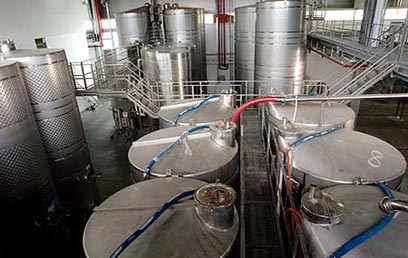
A decade of celebrating wine
If you choose to be a full-fledged wine tourist, it is your personal duty to be aware of the Wine Routes festival of the Judea wineries. The festival began Thursday and will be held until October 22.
This festival, celebrating its 10th anniversary, allows the wine tourist to simultaneously enjoy the freedom to organize a tour of the wineries and various activities offered in each winery as part of the festival.
"The Mateh Yehuda Regional Council is associated with this festival along with two Jewish communities – in Washington and in South Africa," explains council head Nimi Yaffe. "South Africa is the country of wine. The community head came here in 1996 and said, 'Why not here?' and that's how the idea of a festival was born."
At first there were only five wineries, but now there are as much as 26 wineries in the area, producing more than 1,200,000 bottles.
Yaffe concludes the Wine Routes festival in one sentence: "A person who has been to Mateh Yehuda and has not visited a winery, has not been to Mateh Yehuda."
And yet, Dr. Cohen believes wine tourism in Israel has yet to reach its peak. "In Australia, people travel to places where they taste wine all week, and sleep there too. It all revolves around wine. I would like to see such places in Israel as well. I predict a bright future."
Dr. Cohen concludes by offering a tip to all those planning to enjoy every drop rather than spit the wine after every sip like the professionals. "A small glass of olive oil before you start drinking makes the wine flow out," and prevents you from revealing unwanted secrets.
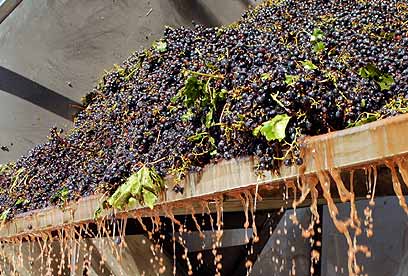
Wine industry in Kibbutz Yiron winery (Photo: Elad Gershgorn)
Ready? Hit the road!
Wine makes glad the heart of man and participating in one of the vintage activities taking place these days across the country is a multifold joy.
At the center of activity in Tali's Vineyard in Moshav Lachish in the Negev are tours of the vineyards and f the Tel Lachish archaeological site, workshops for children, grape squeezing competitions and more (at the cost of NIS 10 – about $2.8). Amat Taninim will hold train tours of the vineyards, a quiz on wine and other activities (for details, please call: 972-4-6361025).
And there are activities for adults as well. At the Recanati Winery in the Emek Hefer industrial zone, guided tours are held at the winery and barrels' room with explanations on the wine preparation process and tasting (NIS 12, visits must be booked in advance, 972-4-6222288).
The Saslove Winery and the Vila Galilee boutique hotel offer a two-night hospitality package for the vintage season, which includes activities, tasting and meals (NIS 850, 972-4-6999563).
On September 18, 26 wineries will take part in a festival marking the 10th anniversary of the Wine Routes of Israel, which will include winery activities, jeep and bike tours, meals and wine tasting.
"Sipping Friday" is a tour of three Galilee wineries with lectures and wine tasting, a Circassian experience, including refreshments (NIS 150, 972-50-8924365).















